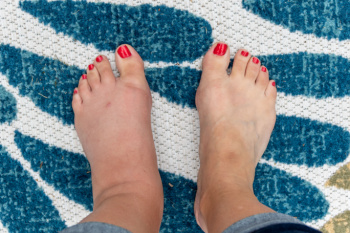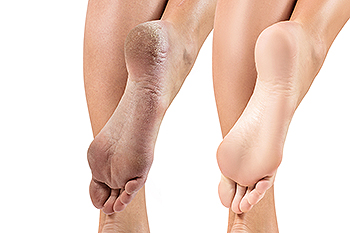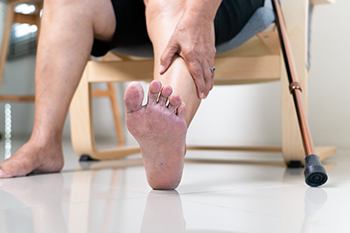Items filtered by date: May 2024
Are You Suffering From Ingrown Toenails?
Uncommon Causes of Swollen Feet

Swollen feet can stem from various unexpected sources beyond the usual suspects like injury or fluid retention. One such cause of swelling, or edema, may be your footwear. Wearing ill-fitting shoes or high heels for prolonged periods of time can impede proper circulation, leading to swelling. A lesser-known cause could be dietary habits, particularly excessive salt intake, which can cause water retention in the body, resulting as swollen feet. Certain medications, such as antidepressants or blood pressure drugs, might also induce swollen feet as a side effect. In some cases, allergies to ingredients in skincare or cosmetic products can trigger inflammation, including in the feet. Additionally, long flights or car rides, where prolonged sitting limits movement, can result in swollen feet due to decreased blood circulation. If your feet have become swollen and remain so, it is suggested that you visit a podiatrist who can help you to manage this condition.
Swollen feet can be a sign of an underlying condition. If you have any concerns, contact Jordan S. Steinberg, DPM of Florham Park Podiatry . Our doctor can provide the care you need to keep you pain-free and on your feet.
Swollen feet are a common ailment among pregnant women and people who stand or sit for extended periods. Aging may increase the possibility of swollen feet and patients who are obese often notice when their feet are swelling too. There may be medical reasons why swollen feet occur:
- Phlebitis - A condition that causes the veins to become inflamed and can also cause leg pain.
- Liver disease - This may lead to low blood levels of albumin which is a protein. This can cause fluid in the blood to pass into the tissues and several areas of the body can become swollen.
- Heart failure - When the heart doesn’t pump properly the blood that is normally pumped back to the heart can pool in the veins of the legs causing swollen feet.
- Kidney disease - One of the main functions of the kidneys is releasing excess fluid in the body. This type of condition can make it difficult for the kidneys to function properly, and as a result the feet may become swollen.
- Deep-vein thrombosis (DVT)- This is a serious condition where blood clots form in the veins of the legs. They can block the return of blood from the legs to the heart which may cause the feet to swell. It is important to be treated by a podiatrist if this condition is present.
Swollen feet can also be caused by bone and tendon conditions, including fractures, arthritis, and tendinitis. Additionally, there may be skin and toenail conditions and an infection may cause the feet to swell. Patients who take medicine to treat high blood pressure may be prone to getting swollen feet.
Many patients elevate their feet to help relieve the swelling and this is generally a temporary remedy. When a podiatrist is consulted the reason behind the swelling can be uncovered and subsequently treated.
If you have any questions please feel free to contact our office located in Florham Park, NJ . We offer the newest diagnostic tools and technology to treat your foot and ankle needs.
Causes and Symptoms of Heel Fissures

Heel fissures are cracks in the skin over your heels that can range from minor discomfort to serious health concerns. Symptoms include can mild discoloration, thickening of the skin, visible splitting of the skin, and bleeding. Without treatment, heel fissures can worsen, leading to open wounds, pain, and even deep ulcers susceptible to infections like cellulitis. Dry skin on the heels is a primary cause of fissures, worsened by conditions such as diabetes, eczema, and fungal infections. Due to damaged foot nerves and decreased moisture, diabetic patients are particularly at risk for heel fissures that progress into non-healing ulcers. To manage symptoms of heel fissures, regular moisturizing is recommended, in addition to exfoliation with alpha hydroxy acids or urea-based creams. If the heel fissures continue to worsen, seeking medical attention from a podiatrist is suggested. This foot doctor can provide specialized debridement to remove thickened skin and prescribe medication to combat infections. If dry skin on your feet is causing problems like heel fissures, it is suggested that you schedule an appointment with a podiatrist.
Cracked heels are unsightly and can cause further damage to your shoes and feet. If you have any concerns, contact Jordan S. Steinberg, DPM from Florham Park Podiatry . Our doctor can provide the care you need to keep you pain-free and on your feet.
Cracked Heels
Cracked heels appear unappealing and can make it harder for you walk around in sandals. Aside from looking unpleasant, cracked heels can also tear stockings, socks, and wear out your shoes. There are several methods to help restore a cracked heel and prevent further damage.
How Do You Get Them?
Dry skin is the number one culprit in creating cracked heels. Many athletes, walkers, joggers, and even swimmers suffer from cracked heels. Age and skin oil production play a role to getting cracked heels as well.
Promote Healing
Over the counter medicines can help, especially for those that need instant relief or who suffer from chronic dry feet.
Wear Socks – Wearing socks with medicated creams helps lock in moisture.
Moisturizers – Applying both day and night will help alleviate dryness which causes cracking.
Pumice Stones – These exfoliate and remove dead skin, which allows for smoother moisturizer application and better absorption into the skin.
Change in Diet
Eating healthy with a well-balanced diet will give the skin a fresh and radiant look. Your body responds to the kinds of food you ingest. Omega-3 fatty acids and zinc supplements can also revitalize skin tissue.
Most importantly, seek professional help if unsure how to proceed in treating cracked heels. A podiatrist will help you with any questions or information needed.
If you have any questions, please feel free to contact our office located in Florham Park, NJ . We offer the newest diagnostic and treatment technologies for all your foot care needs.
Common Foot Ailments in Elderly Individuals

As we age, our bodies undergo various changes, and the feet are often affected. Elderly individuals usually experience common foot ailments that can significantly impact their mobility and quality of life. Among these ailments are bunions, which are painful bony bumps that form at the base of the big toe, often causing discomfort and difficulty in wearing shoes. Another prevalent issue is plantar fasciitis, characterized by inflammation of the tissue that runs across the bottom of the foot, leading to heel pain, especially with the first steps in the morning. Additionally, corns and calluses frequently develop due to friction and pressure, causing thickened and hardened areas of skin that can be painful to walk on. It is vital for elderly individuals to seek proper care and treatment for these foot ailments to alleviate discomfort and maintain their mobility and independence for as long as possible. If you are elderly and have developed foot pain or specific foot conditions, it is suggested that you confer with a podiatrist who can offer you relief options, in addition to guiding you on exceptional foot care practices.
Proper foot care is something many older adults forget to consider. If you have any concerns about your feet and ankles, contact Jordan S. Steinberg, DPM from Florham Park Podiatry . Our doctor can provide the care you need to keep you pain-free and on your feet.
The Elderly and Their Feet
As we age we start to notice many changes in our body, but the elder population may not notice them right away. Medical conditions may prevent the elderly to take notice of their foot health right away. Poor vision is a lead contributor to not taking action for the elderly.
Common Conditions
- Neuropathy – can reduce feeling in the feet and can hide many life-threatening medical conditions.
- Reduced flexibility – prevents the ability of proper toenail trimming, and foot cleaning. If left untreated, it may lead to further medical issues.
- Foot sores – amongst the older population can be serious before they are discovered. Some of the problematic conditions they may face are:
- Gouging toenails affecting nearby toe
- Shoes that don’t fit properly
- Pressure sores
- Loss of circulation in legs & feet
- Edema & swelling of feet and ankles
Susceptible Infections
Diabetes and poor circulation can cause general loss of sensitivity over the years, turning a simple cut into a serious issue.
If you have any questions please feel free to contact our office located in Florham Park, NJ . We offer the newest diagnostic and treatment technologies for all your foot and ankle needs.
Various Types of Foot Protection at Work

In the realm of workplace safety, protecting one's feet is vital to prevent injuries and ensure productivity. Several types of foot protection options cater to diverse work environments and hazards. Safety shoes, featuring reinforced toe caps and slip-resistant soles, provide basic protection against impacts and slips in various industries. Steel-toed boots offer enhanced durability and impact resistance, making them ideal for construction and heavy-duty environments. Metatarsal guards add an extra layer of defense by protecting the delicate bones in the midfoot region from crushing or impacts. For workers exposed to electrical hazards, specialized footwear provides insulation against electrical currents, reducing the risk of shock or electrocution. Each type of foot protection serves a unique purpose, tailored to specific workplace risks and requirements. If you have injured your foot while working, and are looking to learn more about what type of shoes to purchase for total foot protection, it is suggested that you visit a podiatrist who can offer treatment and provide you with the information you are seeking.
While working on the feet, it is important to take the proper care of them. For more information about working on your feet, contact Jordan S. Steinberg, DPM from Florham Park Podiatry . Our doctor will treat your foot and ankle needs.
Working on Your Feet
Standing on your feet for long periods of time can cause stress and pain in your feet. Your whole body may experience change in terms of posture, back pain, bunions, callouses and or plantar warts. There are ways to avoid these conditions with proper foot care, smart choices and correct posture.
Positive Changes
Negative heeled shoe – Choosing this shoe type places the heel slightly lower than the ball of the foot. These are great for overall foot health. Find shoes that fit you correctly.
Go barefoot – Our feet were not designed to be enclosed for all hours of the day. Try to periodically expose your feet to air.
Eliminate Pain
Foot Exercises – Performing simple exercises, incorporating yoga and doing stretches are beneficial. This will allow increased blood flow to the area and muscles of the foot.
Achilles tendon – Stretching the foot out flat on the floor will relax the calf muscles and tendon. These exercises can be performed almost anywhere. Make sure you add these exercises to your daily regimen.
With a little bit of this information and knowing more about foot health, you will notice changes. Foot stretches and proper footwear will help with pain and prevent further issues.
If you have any questions please feel free to contact our office located in Florham Park, NJ . We offer the newest diagnostic and treatment technologies for all your foot and ankle needs.

